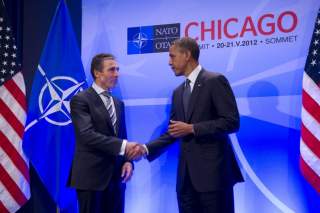Understanding—and Misunderstanding—NATO’s Role in the Ukraine Crisis
Was NATO's open door policy a mistake?
Predictably, some long-time advocates of NATO enlargement have rushed to light up this crisis like a Christmas wish list with some using it to push for policies they have long sought—permanent basing of American troops in Poland and the Baltic states, reintroducing the Bush-era missile defense plans, rushing Georgia into NATO, and providing Ukraine with significant military aid. There is no appetite for these ideas within NATO because the allies well understand that these actions could risk provoking the very outcome in eastern Ukraine that they are trying to prevent—further Russian escalation. Even existing plans, like a long-planned NATO-Ukrainian military exercise scheduled to take place in Ukraine this July could become a further card for Moscow to play and, thus, inadvertently make a bad situation worse.
NATO is a live and active part of Russia’s narrative—and objectives—in this crisis. Moscow has made clear that it believes Russia’s interests require that Ukraine be permanently neutral and with no aspirations towards NATO membership. Ironically, this is the easiest thing for the west to give up, since there is no intention of bringing Ukraine into NATO anyway. The new government in Ukraine has signaled it plans to remain outside NATO, the German foreign minister says there is no future NATO membership for Ukraine, and the United States hints at a future in which Ukraine has long term aspirations for association with the European Union, but will not be a NATO member. Ukraine, especially once it has had new elections, does have its sovereign right to determine its own future. This does not, however, mean NATO is obliged to uphold a failed policy of open door enlargement just to prove a point. America and its allies also have their sovereign right to help Ukraine best understand its interests in the context of neutrality and not NATO membership.
An outcome of this crisis in which Ukraine embraces neutrality is a key element to achieving NATO’s common interest in de-escalation while also punishing Russia economically and politically for its illegal actions in Crimea. However, that outcome means that advocates of NATO enlargement should concede that their worldview did eventually run into the hard rocks of realism. So far as the impact of the 2008 Ukraine and Georgia declaration combines with questions and risks related to collective defense commitments for new NATO members—enlargement critics had it right. It would be tragic for NATO, and especially for the people of Ukraine, if enlargement advocates hold on to a failed idealism at the risk of diplomatic options that can build long-term stability for the Ukrainian people and help to de-escalate a dangerous situation.
Sean Kay is Robson Professor of Politics and Government and Director of the Arneson Institute of Practical Politics at Ohio Wesleyan University. He is also a Mershon Associate at the Mershon Center for International Security Studies at the Ohio State University and is the author of numerous studies on NATO including the bookNATO and the Future of European Security (1998). His new book appears this summer—America’s Search for Security:The Triumph of Idealism and the Return of Realism.

